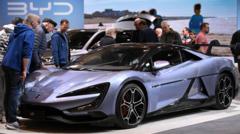BYD's record sales in December signal a strong push against Tesla, with the Chinese automaker reporting an annual total of 1.76 million EVs sold, a significant leap in the market that is reshaping the automotive landscape.
BYD's Sales Surge Puts Pressure on Tesla's Dominance

BYD's Sales Surge Puts Pressure on Tesla's Dominance
Chinese electric vehicle manufacturer BYD experiences a remarkable increase in sales, intensifying competition with Tesla for the top spot in global EV sales for 2024.
Chinese electric vehicle (EV) manufacturer BYD is closing in on industry giant Tesla as it reported a substantial increase in sales at the end of 2024. In December alone, BYD sold an impressive 207,734 EVs, bringing its yearly total to 1.76 million. This boost in sales is attributed to attractive subsidies and discounts, drawing consumers towards their offerings.
As Tesla prepares to reveal its own quarterly sales figures, it remains to be seen if it can maintain its slim lead over BYD, which is rapidly narrowing the gap. In fact, BYD's overall vehicle sales soared over 41% year-on-year, driven primarily by its hybrid model sales. The Shenzhen-based company has benefited from a surge in vehicle sales within China, propelled by fierce market competition that has reduced prices, coupled with government incentives urging consumers to switch to more fuel-efficient vehicles.
Currently, BYD sells 90% of its vehicles in China, where it enjoys a growing lead over traditional brands like Volkswagen and Toyota. The rise of BYD signifies a significant shift in the automotive industry, especially in contrast to legacy automakers who are encountering difficulties in Western markets.
At the same time, Honda and Nissan have revealed they are in discussions to merge, reflecting the pressure faced by Japanese manufacturers in light of rising competition from Chinese automakers. In a further sign of distress, Volkswagen has secured a deal with the IG Metall union to prevent plant closures in Germany amidst fears of redundancies due to cost-cutting measures.
Despite BYD's accelerated growth, Tesla managed to sell more EVs overall, indicating that the competition is far from settled. Nonetheless, BYD's revenues surpassed 200bn yuan ($28.2bn) in the third quarter, marking a 24% increase from the previous year, which for the first time outpaced Tesla's quarterly revenue of $25.2 billion.
Chinese electric vehicle producers are aiming to expand their market influence globally, however, they are facing challenges in key markets. The European Union recently implemented tariffs of up to 45.3% on imports of Chinese-made EVs, while the US imposed a 100% duty on Chinese EVs, with further tariffs anticipated under the incoming administration.
In recent developments, BYD faced a setback in Brazil, their largest market outside China, as construction of a new factory was halted due to allegations concerning worker conditions. BYD has severed ties with the construction company involved, reiterating its commitment to comply with Brazil's regulations as it aims to reinforce its international presence in the EV landscape.




















